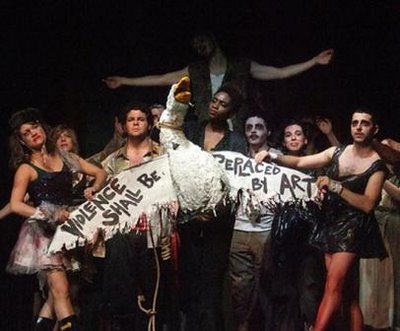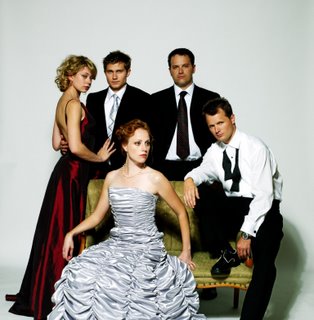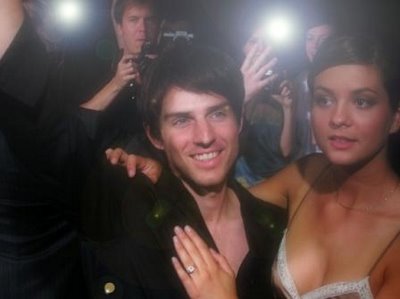While everybody worries about the violent disasters of the world, Chad Beckim has put his finger on the pulse of an urban catastrophe. In 'nami, he explores ghetto life and working-class insanity (literally) and, aided by a talented cast and a gifted director, puts on an entertaining show, too.
---------------------------------------------------------------------------
Reviewed by Aaron Riccio
Why is Chad Beckim going back to school for an MFA in '07? He's already co-founder and co-artistic director of the intriguing theater company Partial Comfort Productions, and his new show with them, 'nami, is a substantive showcase of urban life and social struggles. Beckim's material is intellectual, but written with the authentic voices of the working class: 'nami is more immediate and dramatic than some of the stuffy, sterile scripts that other companies put out. While not yet an epic writer, Beckim is on his way towards becoming a modern Odett (or an urban Shepard), and director John Gould Rubin shows a masterful vision (and love) of theater.
Heather Wolensky's set features a battle-scarred sofa, grimy windows, once-white curtains, and a lonely hanging ceiling fan. It looks and feels like a prison, and that's how it's used. For Lil (Eva Kaminsky), a mentally imbalanced woman who celebrates her fifteen-year anniversary by sleeping on the floor in her wedding dress, it's where she waits for her husband, Harry (Mark Rosenthal), to tell her what to do. For Roachie (Alfredo Narciso), it's a place he's always itching to leave, and for his girl, Keesha (Quincy Tyler Bernstine), it's a place to crash between double-shifts at a local McDonald's. It's the type of place where failing to pay the rent might make the local drug-dealing pimp cum slum lord, Donovan (Michael Gladis), force you to harbor a four-year-old girl while he tries to sell her into sexual slavery. It's a deus ex machina that comes early in the play and goes explored, but it gives us a reason to watch these lively characters, and Beckim doesn't leave a dull moment. If anything, there's almost too much action in the second act, but that's hardly a complaint, just a gasp for breath. (Violent, too, thanks to Qui Nguyen, the fight choreographer.)
Though there are two apartments, director John Gould Rubin uses the same set for both, which emphasizes the equally dismal circumstances of both couples. He also chooses to stage the transitions, too, using choreography to move the characters in and out of each other's scenes up until a climactic moment where two scenes take place simultaneously, yet separately. Good as Beckim is, he owes much to Rubin for tightening up the logic of the play. Eva Kaminsky deserves some respect too: her role as the often-hysteric (yet believable) housewife occasionally lapses out of character, but she keeps it in check. (About the abortion-they-don't-talk-about, she suddenly screams: "Strap me bare like some abandoned mine shaft.") The rest of the cast is excellent, particularly Quincy Tyler Bernstine, but their dialogue is more consistent.
'nami doesn't have an agenda, or a message to portray, and because of that, the work is entirely character based. People rise, and people fall, and watching our struggles through their struggles is a part of how great theater can pull us up from our lowest lows.







